Text
Eurovision 2004 - Number 60 - Eneda Tarifa - "Qëndroj"
youtube
Festivali i Këngës is not the only Albania music festival. In 2001 Eneda Tarifa made her debut at Kënga Magjike on rival channel TV Klan. Although she didn't win, she did enough to warrant an invitation to the big show in December 2003.
This is her first appearance here and she's brought her own song Qëndroj (Stay) written with Erjon Zaloshnja fellow musician and soon to be her husband. The lyrics talk about getting older, with thoughts that don't fly quite as quickly as they once did. The night is approaching. All is not lost as Eneda has a love who will make it all bearable. A love she can't do without. However heavy a burden there is, it can be carried with him by her side.
I love the ones where the song-writers are clearly writing about each other!
It's a song for a big voice and perhaps Eneda isn't quite there yet. Where the song should soar, she's just about able to get there, but that ability to belt and emote will come with age. She's just starting out here and already showing the talent to both sing and right the grand devotional song.
This time it was not to be. Although she made it through the FiK semi-final, in the final she was not placed. She'd be back in four years time for another go. Her last try was in 2015 when she won the whole thing, carrying Albania's flag into Eurovision 2016. I'm sure we'll see here again in the future
#esc#esc 2004#eurovision#eurovision song contest#istanbul#istanbul 2004#Youtube#not a national final#Albania#Festivali i Këngës 2003#FiK 42#Eneda Tarifa#Erjon Zaloshnja
2 notes
·
View notes
Text
Eurovision 2004 - Number 61 - Lena Philipsson - "It Hurts"
youtube
Before 2004 Lena Philipsson, had already had her face on a stamp. Her enthusiasm for sewing and making her own clothes has been parodied on a Swedish comedy show. She had toured a show in which she became a female James Bond secret agent with her own musical theme. Let's say that Sweden was very well aware of her.
In the 1980s she participated in three consecutive Melfests - finishing second twice. After her third try failed to yield a Eurovision appearance, she'd moved on into pastures new and her career as a music and TV personality took over. She still found time to write songs, including Arvingarna's 1999 Melfest song Det svär jag på (I Swear It). There were many rumours during the 90s that she'd be returning to Melfest, but she never did.
It wasn't until 2004 when Det gör ont came along that she finally returned. Written by Thomas 'Orup' Eriksson, it drew Lena back to the competitive stage. Her performance won both the jury and the televote - there was no real challenger. That took her to Istanbul, a vibrantly pink dress and some accusations in Sweden that her performance was modelled on that of Steven Tyler of Aerosmith, suggestively dancing with a mic stand.
The English language version of the song, It Hurts, is outburst of heart ache to a peppy pop track. Lena doesn't look particularly like it hurts very much as she delivers a masterclass in owning a stage and hitting some big notes. She struts, seduces the camera and makes her pain seems some what enjoyable. All of this was enough to get her and Sweden into fifth place on the scoreboard in what is a strong year.
That wasn't the end of her association with Eurovision. In 2006 she hosted Melfest, causing a minor scandal as the nation's parents covered their children's ears during some of her bluer jokes. Afterwards there were more big albums and tours including one with Orup - the songwriter of It Hurts. She's an establish Swedish music and TV personality to his day with her most recent album ending up at the top of the Swedish itunes charts in 2020.
#esc#esc 2004#eurovision#eurovision song contest#istanbul#istanbul 2004#Youtube#Lena Philipsson#national finals#Sweden#Melodifestivalen 2004#Thomas 'Orup' Eriksson
1 note
·
View note
Text
Eurovision 2004 - Number 62 - Linda - "Aria, sole, terra e mare"
youtube
Linda Valori is a singer having a bit of a moment. Her career had been escalating slowly since she started out in the mid 1990s. She'd won singing competitions, auditioned for the Italian Popstars series (although she missed out on being part of the resulting band - Lollipop), and won prizes.
In 2004 she got the big call up - singing in the main competition at Sanremo with her own song. She'd not even been in the Giovani competition prior to this, she had no albums out. That was probably because there had been a change at the top of Sanremo. There was a new artistic director in Tony Renis and a new presenter in Simona Ventura. There weren't many big names competing which gave new opportunities (even though it led to unprecedentedly low TV ratings).
Linda grabbed one of those with Aria, sole, terra e mare (Air, Sun, Earth and Sea). It's a song about experiencing everything and more. Grab it all, drink it all in, dance with joy, and have no regrets. Quite apart from it's celebratory intentions, it's a showcase for Linda's magnificently soulful voice. Although every source I've looked this up on claims that it's either pop or europop, it ain't that. It's got a lot more about it than that. Pop-soul at the very least.
Her status as being an outsider didn't stand in her way. She finished third - which as far as her career went was exactly the right place to finish in. She didn't want to become the new Jalisse. Within two months of Sanremo, she was asked to perform of Pope John Paul II.
She went on to perform at papal invitation five times and for three different Popes. Collaboration with other musicians began, notably including Massimo Ranieri. She was a regular on RAI music specials, and she's recorded songs for Benetton and Disney. She's also recorded four of her own albums and toured extensively to this day. Most recently she's been touring alongside Musicamdo Jazz Orchestra as a new project called the Soul, Rhythm and Blue Explosion
#esc#esc 2004#eurovision#eurovision song contest#istanbul#istanbul 2004#Youtube#festival di sanremo 2004#Italy#not a national final#Linda Valori#sanremo
3 notes
·
View notes
Text
Eurovision 2004 - Number 63 - Miguel - "Muéveme"
youtube
For the third year in a row, Spain excitedly tuned in to Operación Triunfo to find out who would be their new King or Queen of pop for the year. One of those in the last four was Miguel Cadenas. Like last year, each of the final four had three songs and each week one of those songs got voted off by the judges until one remained. Muéveme (Move Me) was Miguel's last remaining song.
Not unusually for Spain's selections in the years to come, it's una canción de fiesta. Full of tresillo maracas, bikini-clad dancers and party trumpets. It sounds like it should be sung by Miguel with a huge smile on his face as the party swings its hips around him. But the lyrics though...
It's the second song in a row that I've covered that has a theme of poisoned hearts. Yes, Miguel's in love, but that love - well, it's not healthy. He needs a remedy, and he's on the cusp of getting the hell out. Yet the answer he thinks is for his venomous seducer to provide some antidote - in the form of dance. Oh, poor, poor Miguel. How it must hurt?
Throughout the competition Miguel hadn't been the favourite. Flying largely under the radar, never in danger of elimination, but never the star. In the Eurovision gala at the end, he made it safely into the top 3, but that was it. Muéveme wasn't enough and Miguel would have to live with his poorly poison-addicted heart alone.
Afterwards there was an album and many singles - but it appears that was the limit of record company interest in him. He still does write and produce music but as the lack of an entry on Spanish Wikipedia attests, his celebrity status didn't last long after then end of 2006.
#esc#esc 2004#eurovision#eurovision song contest#istanbul#istanbul 2004#Youtube#Operación Triunfo 2004#Spain#Miguel Cadenas#national finals
1 note
·
View note
Text
Eurovision 2004 - Number 64 - Ermiona Lekbello - "Ç'punë ke ti me dashurinë"
youtube
Up to 64. It's definitely a marathon and not a sprint now.
Welcome to FiK. Albania made their debut at Eurovision this year and chose to use RTSHs longstanding annual mid-December musical spectacular to select their entry. The 42nd Festival i Këngës, as usual, had a multi-evening format reducing the field down to 18 for a grand final. One of those to make the final was Ermiona Lekbello.
In my short amount of research time I haven't been able to find out much about Ermiona. The only major event that I can find in almost any search engine or news report is that she recently appeared in the 2nd series of Albanian Celebrity Big Brother alongside her daughter. I do know that this was the first of two FiK appearances for her and that it came at the beginning of a short musical career after which she left Albania and now lives largely in both Italy and the USA.
Yet, here she is in front of the nation singing a song written by Arben Duka (poet and solider) and Flamur Shehu about the inadequacies of a man. Given that it's written by someone who's a poet and a solider, it's intriguing that the final verse translates like this:
Oh bad dream how well it ended
I was left with a poem
Go, go, die, become a king
But you are not for love.
Maybe some personal experience creeping in there? It's an interesting song - structurally it's unusual for Eurovision in that there's no chorus/verse distinction. It's the same section repeated over and over, albeit with some variation in chords and mood. The combination of a synth rhythm and a full suite of brass feels tremendously Balkan.
It's managed to make it this far largely on the recorded version. I only found the FiK performance after it had already achieved this stage of my bracket and I discovered that Ermiona's vocal performance wasn't up there with the best. Still I'm true to my bracketry and thus it' remains in 64th place.
#esc#esc 2004#eurovision#eurovision song contest#istanbul#istanbul 2004#Youtube#Albania#Festival i Këngës 2003#FiK 42#Ermiona Lekbello#Arben Duka#not a national final
0 notes
Text
Eurovision 2004: The Postcards

2004's postcards are very much of the old school. Each one takes us around Türkiye's sights and scenery mostly from helicopters. Given this is the country's first time hosting and therefore they're first time to show themselves off to however many 100s of millions of viewers, why not grasp it?
I'm sure the already big Turkish tourist industry was very happy. It feels remarkably like something from the 1970s or 1980s, like a promotional tourist film for each location covered
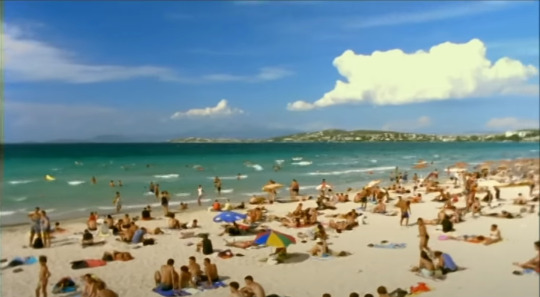
There's no attempt at a narrative in each postcard, nor is there any humour. Unfortunately we do not see the acts in the postcards either. They're literally straight tourist promo shorts.
At the end of each postcard, a satin-clad dark-haired woman poses and releases a heart towards us (using a variety of methods), each of which contains the flag of the next performing country. Try as I might, I couldn't find the name of the woman.
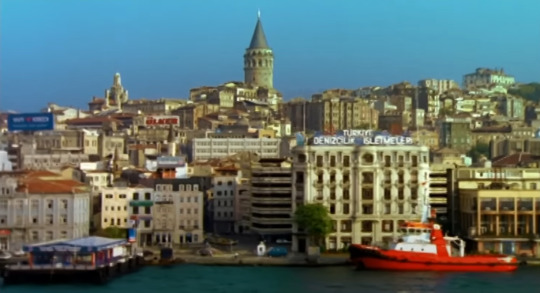
1 note
·
View note
Text
Eurovision 2004: The Interval Act and Other Performances
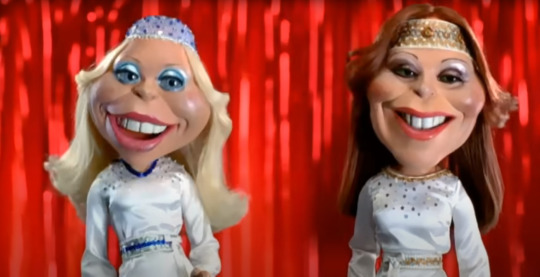
Two shows, two intervals! It's the first bit of new programming needed for this year's Eurovision. You can do the same postcards in both contests. The scoring sorts itself out, but what are you doing to do about the musical bits? You need something different for each show.
Starting with the semi-final and one of the weirdest interval acts there's ever been - and also one of the hardest to see today in context. A six-minute long comedy film featuring ABBA as puppets made by the Jim Henson workshop. It features the band auditioning in 1974 for a record company executive played by Rik Mayall.
Having this in the middle of what is a thoroughly Turkish show featuring traditional drumming is a bit odd to say the least. 2004 was the 30th anniversary of ABBAs win and since their fractious split in the 1980s, their popularity and pull was only increasing. The demand for appearances, reformations and shows was getting louder all the time - so how to achieve this when they were no wanting to appear publicly? Why not puppets?
The entire short was called ABBA - Our Last Video Ever, a title that carried with it the air of something celebratory, momentous, and definitively final. Something that had been wanted for more than a decade and was here. The reality didn't meet those expectations, it being more of a comedy sketch and with very little actually in the way of the members of ABBA.
If you bought or saw the full semi-final after the night it was show, the ABBA short wasn't there - you had to buy it separately, and for a while was exceedingly hard to find.

The Grand Final stuck more to tradition with lines of dancers, instrumentalists and drummers. All aspects of Turkish musical culture were covered in a presentation by the group Fire of Anatolia, a huge dance ensemble. The scale and tradition of it did harken back to Riverdance in terms of ambition, although the result didn't have the same impact.
The one other musical number was Sertab Erener opening the show with a reprise of her winning song Everyway that I Can as well as another of her songs Leave. The first song had the same choreography as her win, but with male dancers and Sertab herself was fully dressed in gold. For the second half of the show, a group of Sufi sama dancers spinning and whirling around her.
There was a mid-run break in the grand final - but this served as an attempt to go around watch parties being held in Europe, although the link-up mostly failed leaving the hosts to fill while adverts aired on TV.

#esc#esc 2004#eurovision#eurovision song contest#istanbul#istanbul 2004#TRT#ABBA#Rik Mayall#Jim Henson#Sertab Erener#Fire of Anatolia#interval acts
1 note
·
View note
Text
Eurovision 2004: The Stage and Set Design
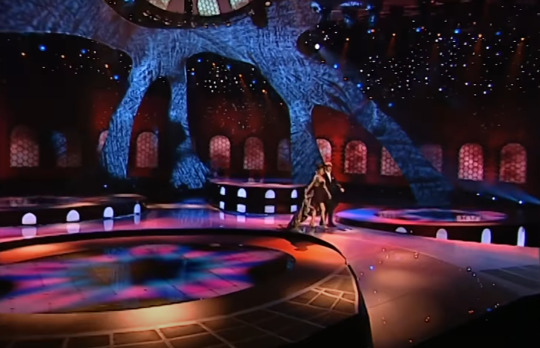
For the first time in three years, there aren't any worries about money and whether Istanbul will be able to afford to host Eurovision this year - even though there is now the added expense of a semi-final to deal with. The only wrinkle was that the venue changed at relatively short notice from the intended Mydonose Showland to the Abdi İpekçi Arena as the latter had a bigger capacity. You can see from the footage that both shows were sold out. Türkiye loves Eurovision and Eurofans were not going to miss out on this first opportunity to host it.
The stage learned a lot from Riga the year before. It's a wide open space with lots of smaller sub-areas to arrange the band on - making it possible to have a smaller set up or a larger one. It's not angled down quite so much as 2003, however the crowd have clear visibility from all angles of who is on the stage.

That crowd are clustered relatively close to the stage; there are plenty of camera shots through the arms and flags of the audience to the performers. The camera runs are well-disguised with remotely operated cameras at the sides and rear of the stage. There's also a steadicam. Various sections of the floors have LEDs again.
At the rear of the stage, there are what I think are projection screens rather than LEDs. They can have basic images screened on them, but don't seem to be bright enough to really do much else - although it did manage to give the impression that Sertab's helicopter had landed behind the stage at the beginning.
The one thing that seems to be missing this year is pyro. That may have been a limitation of the venue. However they make for that by projecting fireworks on the screens at the back of the stage.
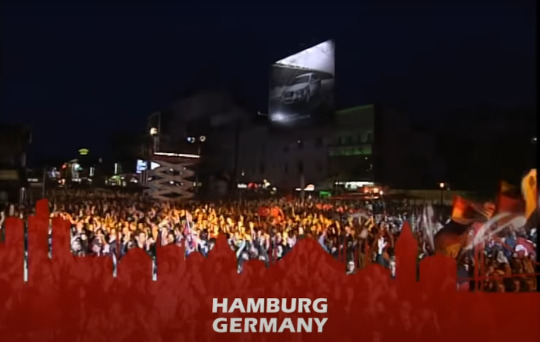
The on-screen graphics are simple, featuring lots of red and white, plus it's the first time we have hearts with the flags logos that are now ubiquitous.
One thing that I should have mentioned several years ago is that since 2002, there hasn't really been a separate scoreboard, or a screen dedicated to showing it. Something that had been a huge feature of earlier Eurovision's was now all on-screen. There are no shots of the audience during the scoring sequence, so it's not obvious what they're seeing in terms of a scoreboard this year, although the two presenters have a podium that's been brought on stage to stand behind whilst they talk to the spokespeople of Europe.

The table of supervisors, adjudicators and vote verifiers from the EBU is, wonderfully, an actual red-draped table set up at the side of the stage. Not off in the boxes of the stadium, they're right there in the action, although once the lights are off them, they retreat into the shadows, job done.
Unlike last year, the green room is a bit of an afterthought. Still in red and white, it's not clear where exactly it is, but it does take the winners a very long time to make it from the green room back to the stage to receive the trophy.
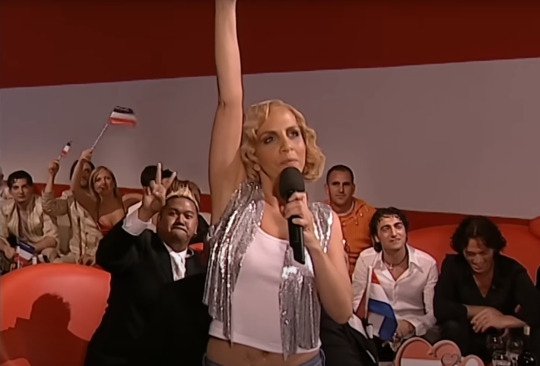
The show the stage and set were designed by Esra Akbulut and Sette Sette Design, who did a great job considering the late change of venue. It was produced by EMT - Event Management Team, with executive producer Bulent Osma, producer Mushin Yıldırım and directed by Sven Stojanovic.

#esc#esc 2004#eurovision#eurovision song contest#istanbul#istanbul 2004#Türkiye#TRT#Abdi İpekçi Arena#stage design#production design
1 note
·
View note
Text
Eurovision 2004: The Scoreboards

For some reason, I've neglected to mention that, for the past two years, each host has selected a slogan or theme for that year's Eurovision. In Tallin it was A Modern Fairytale, in Riga it was Magical Rendez-vous. This year, TRT have gone with Under the Same Sky which given the location of Istanbul, the city that's in both Europe and Asia makes a whole heap of sense.
That theme is reflected in the layout of the scoreboard. Two arcs of nations either side of the spokesperson delivering the results. Albeit with the implication that the European half of the results are a much, much better than the Asian side.
Another first is that the flags of the countries are present inside heart-shaped cut outs. That heart is going to become ubiquitous. It's used all over the place this year and will be back in the future.
Now there's a semi, there's more than one scoreboard. More for the graphic design department to do - although not too much more. The scores aren't given at the end of the semi, only a list of the winners. That's a relatively simple task.
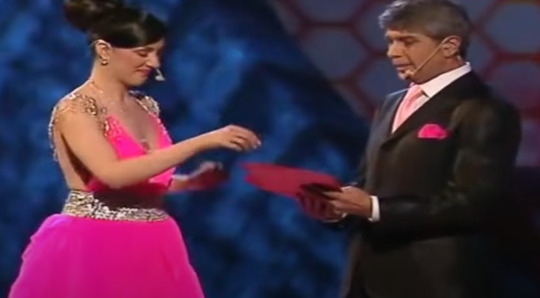
The results reveal for the semi final is done in a very traditional manner with the hosts picking from a set of red envelopes at random to reveal each of the qualifiers. It should be tense, yet somehow it's not quite there yet. Work to do.
Time for the spoilers.
The ten qualifying countries were (in order of the number of points they received):
Serbia & Montenegro - 263 points
Ukraine - 256 points
Greece - 238 points
Albania - 167 points
Cyprus - 149 points
Netherlands - 146 points
Bosnia & Herzegovina - 133 points
Malta - 74 points
Croatia - 72 points
North Macedonia - 71 points
There was quite a big drop down to Israel in 11th place who had 57 points. These scores were only released after the grand final.
Those ten countries joined the 14 other pre-qualified countries in the grand final. There was a lot less tension in the scoring this year. Two countries jostled for the lead for most of the sequences, but in the end Ukraine pulled clear with a few countries still to go. Slovenia this time were the third last voters and it was once again joker Peter Poles delivering the points that cemented the winner. With two countries to go, Ukraine couldn't be beaten - even though they were the final country to vote.
At the bottom end of the scoreboard, there were no nul points this year, but there weren't many points in total at all. The seven bottom countries all got fewer than 20 points. There was chasm between the top 6 and everyone else.
The grand final full results were:
Ukraine - Ruslana - "Wild Dances" - 280 points
Serbia & Montenegro - Željko Joksimović and Ad-Hoc Orchestra - "Lane moje" - 263 points
Greece - Sakis Rouvas - "Shake It" - 252 points
Türkiye - Athena - "For Real" - 195 points
Cyprus - Lisa Andreas - "Stronger Every Minutes" - 170 points
Sweden - Lena Philipsson - "It Hurts" - 170 points (joint 5th)
Albania - Anjeza Shahini - "The Image of You" - 106 points
Germany - Max - "Can't Wait Until Tonight" - 93 points
Bosnia & Herzegovina - Deen - "In the Disco" - 91 points
Spain - Ramón - "Para llenarme de ti" - 87 points
Russia - Julia Savicheva - "Believe Me" - 67 points
Malta - Julie and Ludwig - "On Again... Off Again" - 50 points
Croatia - Ivan Mikulić - "You Are the Only One" - 50 points (joint 12th)
North Macedonia - Toše Proeski - "Life" - 47 points
France - Jonatan Cerrada - "À chaque pas" - 40 points
United Kingdom - James Fox - "Hold On to Our Love" - 29 points
Poland - Blue Café - "Love Song" - 27 points
Romania - Sanda - "I Admit" - 18 points
Iceland - Jónsi - "Heaven" - 16 points
Netherlands - Re-union - "Without You" - 11 points
Austria - Tie Break - "Du bist" - 9 points
Belgium - Xandee - "1 Life" - 7 points
Ireland - Chris Doran - "If My World Stopped Turning" - 7 points (joint 22nd)
Norway - Knut Anders Sørum - "High" - 3 points
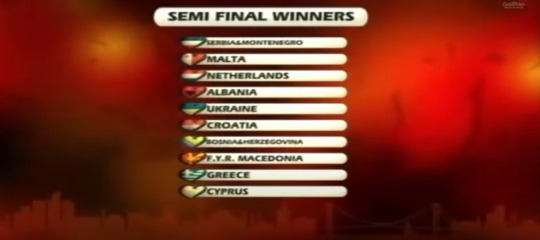
1 note
·
View note
Text
Eurovision 2004: Qualification

Finally - semi-finals are here. Only one for now, with ten countries plus the big 4 pre-qualified, but just the opportunity to appear on the stage without the risk of being chucked out has got everyone back. Well nearly everyone. Denmark, Lithuania, Finland, North Macedonia and Switzerland all return as do Monaco, back after last competing in 1979. Alongside them are the debutants - Albania, Belarus, Andorra and technically, Serbia & Montenegro. For the first time since Yugoslavia broke itself apart in war, all the former Yugoslav countries are back in Eurovision. These 10 new and returning counties get to perform alongside the 26 countries who appeared in 2003 making 36 countries in all. A huge new record.
With lots of new countries come lots of new national finals, or in the case of Albania, a very old one indeed.
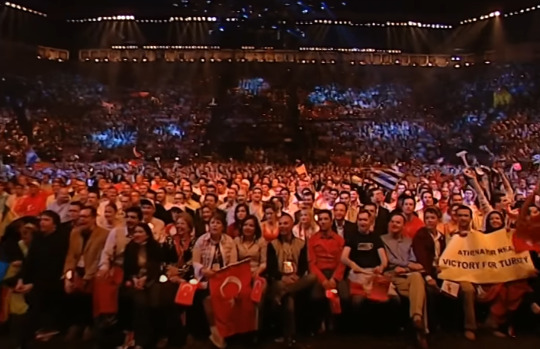
There are six internal selections, but that makes 30 national finals. 30. That's a lot of songs. There are three song selection finals (Israel, North Macedonia and Türkiye in their hosting year) among them, but alongside the new record number of countries there's a huge new record in the number of song competing to get to Eurovision. In total there are 503. Last year there were 325. That's slightly over 50% more.
Wow.
This was a hugely expansive year for Eurovision - not only new countries, but now Eurovision was a week long event, with a new mid-week TV event as well as the main grand final on the Saturday - even if three countries refused to broadcast the semi-final as they weren't in it. There was a new format to invent for the semi-final. How would the winners and losers be announced? They couldn't reveal the points in case the final was biased by them. The EBU was in experimental mode live on TV.
Nevertheless the expansion seems to have been a joyous one for nearly every competing country. A new era to explore for everyone.
The question is with all these new countries, new national finals, will the improvement in quality that we've seen in the past two years continue? Will it all be filler and a step backwards? How quickly will all the new countries find their feet? And can the returnees find new impetus to find something really good now there's no threat to their participation next year.

1 note
·
View note
Text
Eurovision 2004: Welcome to Istanbul!

Another year, another new host country. Hello from Türkiye and Istanbul! It's the first time since 1997 the contest has been hosted in a city other than a country's capital and Türkiye are determined to show off the city as well as the rest of the country's culture, sights and sounds.
The host venue is the Abdi İpekçi Arena, Istanbul's main basketball arena, with a crowd capacity over 12,000 - more than double the previous two contests. The swooping helicopter shots during the intro sequences show off not only Istanbul but the size of the crowd inside the arena. That helicopter seems to land at the back of the stage via the magic of mid-2000s computer trickery. On board, and distinctly un-windswept, is last year's winner Sertab Erener. She's here to wow the crowd with her winning song as well as medley of two songs from her album No Boundaries
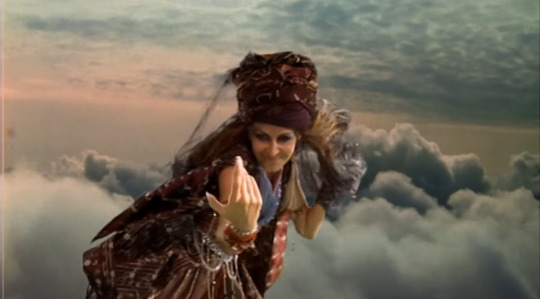
For the first time, this is not the first shot the TV audience has seen of this year's Eurovision. For the first time there's been a televised semi-final from the same arena, with the same huge crowd, to select the ten songs that will be joining the big four and the top ten finishers of 2003 in the final.
That semi-final itself has 22 participants, almost as long as the final itself, and serving as a first run through for the production team. Now that there's no relegation, the gates have been flung wide. Not only have all of last year's relegated countries returned, but so has Monaco! Sort of returning is Serbia and Montenegro, joining the other former Yugoslav countries. Alongside them are the debutants. They've all been knocking at the door for years but now Albania, Belarus and Andorra are finally here.
Luxembourg and Hungary were also in talks to return, however they didn't join in this year for various reasons. In total 36 countries took part in Eurovision this year a record by 10. The semi-final is an opportunity to see some songs twice, to get double the amount of ticket money and advertising revenue. It's more expensive to host, sure, but the benefits are great. It's amazing it took the EBU this long to take the plunge.
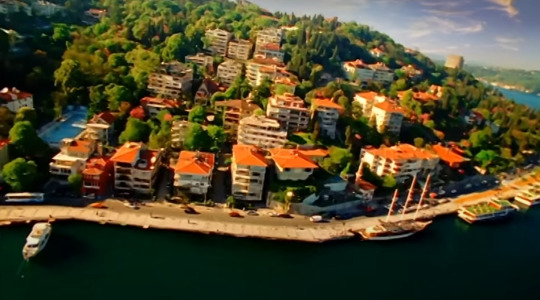
The voting remains 100% televoting after the success of last year. For the first time ever, the final was legitimately 100% televote. There were a few issues in the semi-final which led to Monaco using a jury vote, but those were fixed in time for the final. All the countries got to vote in both the final and semi-final with the exception of Russia, France and Poland who deigned not to broadcast the semi-final as none of them were participating in it.
Mysteriously, the reverse recap that had been having such a good effect on nullifying the running order bias, was gone and a standard recap in normal running order was brought back.
There's very little fat on the final this year, with an intro consisting of just Sertab's performance, no travelogue's and the trip around Europe to see live Eurovision parties is saved for the single break at halfway through the performance sequence.
Our hosts are actors Korhan Abay and Meltem Cumbal. Korhan is keener on speaking French than English, but Meltem handles most of the English speaking duties with aplomb. Sertab Erener is given the job of presenting live from the green room.
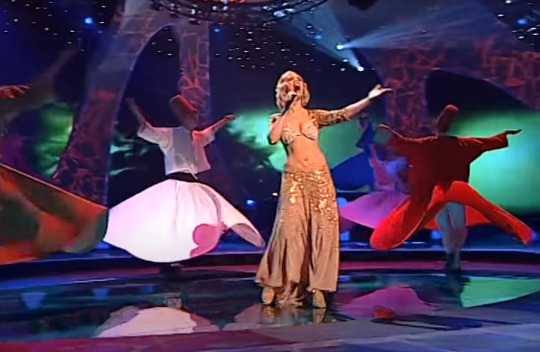
#esc 2004#esc#eurovision#eurovision song contest#istanbul#istanbul 2004#Türkiye#Abdi İpekçi Arena#Korhan Abay#Meltem Cumbal#Sertab Erener
2 notes
·
View notes
Text
More Songs, More Changes...

I've been looking ahead and doing some serious counting.
2003 with 48 songs and extra bits has been coming out at a rate of one article a day for about 8 weeks and I'm about to embark on writing up 2004 - which I have now finished listening to.
Going through 2004 has been a huge undertaking. There are 503 songs in total thanks to the semi-finals. That's taken me just shy of 10 weeks to get through.
In 2005 there are more than 55 songs on top of that. It's probably closer to 580 songs in total (thanks Ukraine). That will take me at least 11 weeks.
By the time I've finished blogging 2004 in just over 8 weeks time, I won't have finished going through 2005. Unless. Unless...
I upped the blog to 48 songs a year two years ago. I'm going to have to do 64 songs for 2005 or find a new method of giving each song a fair chance. I do have ideas on doing that, but as I'm enjoying re-enacting every year's national final season a great deal, I'm loathe to restrict the number of listens each song get - even if they're bad.
So from 2004 the number of blogs is going up again! There will be a top 64 for 2004 - I hope you can cope.
The good news is that even though the year is much bigger, the overall quality has improved. Hopefully you'll notice that with the songs at the bottom end of my ranking and you'll look forward to the top end with mounting excitement.
64 does feel like way too many songs to be sensible to me, even though it's only about 15% of the songs in the national finals, and there are a few songs that I like that didn't even make my top 64. But let's see how this goes.
Fingers crossed.
1 note
·
View note
Text
Eurovision 2003 - Wrap Up
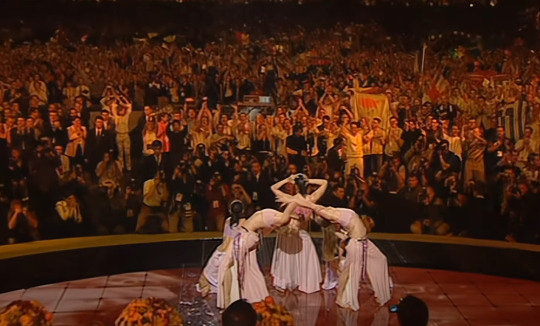
2003 is an iconic Eurovision year. They year that ended the dark period. The year they fixed the voting. The year the girl bops broke through. The year the right song won (sorry Belgium). The hosts were fun, the small budget was spent in the right places, the controversy was confined to a single delegation whose outrages seem to me, more and more like a politically confected response to the problems and allegations surrounding the voting in 2002 - and even they had a good song.
Look at how many of the Eurovision qualifiers made it into my list this year. The winner hasn't been this high since 1993! In the current songfestival.be top 500, there are 6 songs from 2003, up 3 from 2003 - a 100% increase!
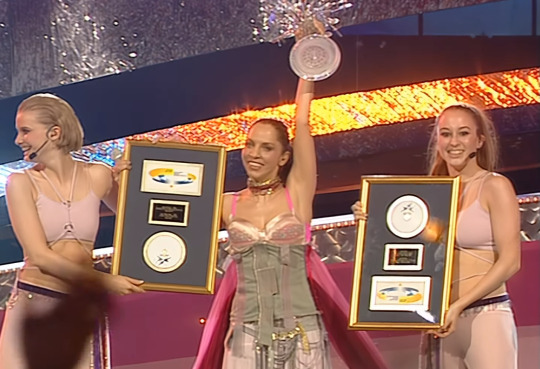
That's not to say that the national finals weren't good. They were and they chose well. Melfest (and the Nationaal Songfestival) alighted on its modern structure and stuffed itself with what Sweden loves most. Iceland and RÚV outdid themselves by organising a national final that was filled with Icelandic musical talent that could only have been bettered if they'd managed to get Björk and Sigur Rós. Poland put on its first national final with Krajowe Eliminacje and instantly had national flavour and quality as if it had been going for many year.
Around Europe, several names, who would come to be synonymous with Eurovision over then next two decades, were entering with their débuts. There was disco, there was indie, there was Europop, there was jazz and metal and schlager and folk and experimentation. There were even songs in made-up languages. Wherever you look around Europe in 2003 there's improved quality and huge variety.
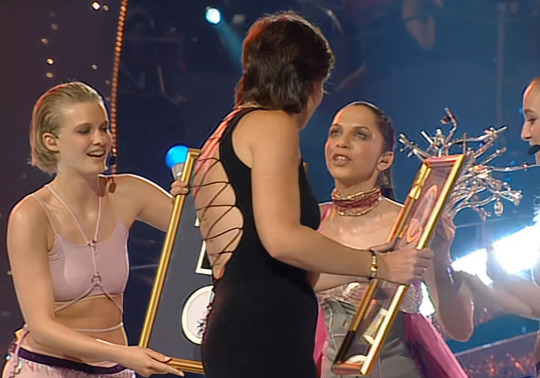
The voting sequence of 2003 is possibly the best one ever. There were few technical problems and the ones they did have didn't effect the outcome. The hosts have a few moments of the usual cringe, but their styling and looks cannot be beaten. Latvia is a very, very cool country and despite a lot of criticism before hand, the evening itself was a triumph.
The inventive set design and the magnificent green room would set the minds of future production design teams alight with ideas and possibilities. If any year demonstrates what can be achieved with creativity on a budget - even if the first thing that comes to the mind of the average Eurovision fan thinking back to 2003 is modelling clay.
So many things went well. Even better for 2004, the EBU are letting everyone in. Announced prior to the final, the semi-final era is upon us. No more relegations! Everyone can take part now - even Europe's small countries and microstates who left during the 1990s. Eastern Europe can finally be properly welcomed to the Eurovision family. Everything is awesome again!
Goodbye Riga, we'll miss you. It's onto Istanbul and the third first time winner in a row. Türkiye, show us what you can do.
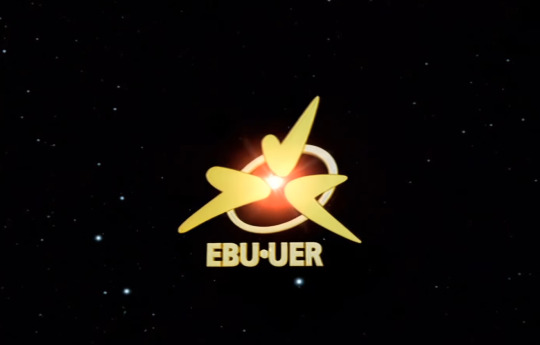
3 notes
·
View notes
Text
Eurovision 2003 - Televoting Watch
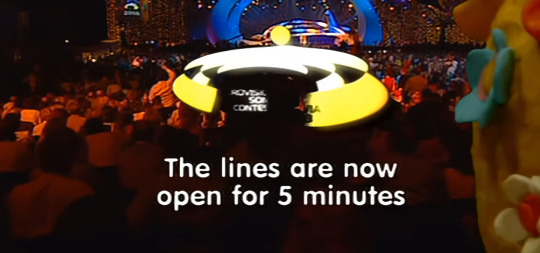
The fallout from the 2002 vote-buying allegations saw the EBU attempting to eradicate the juries once again. And once again there were still three juries used. In this case there were only supposed to be two (Bosnia & Herzegovina and Russia) but in Ireland, RTÉs televoting partner failed to deliver the votes in time and had to rely on their back-up jury - something that the Russian delegation would later strongly complain about.
Given there were only three juries, the conclusions from the results aren't maybe as interesting as 2002 or 2001, but there are still notable differences.
Looking first at the effects of running order and the reverse recap, now in use for the second year - and what wonder is this? The first-half of the running order got the most votes! A first! And even more surprising, the televote favoured the first-half more strongly.
The overall difference between the first and second halves of the running order is still second narrowest so far (only last year was closer), so for the second year, the running order was effectively nullified.
This reverse recap thing, it really works you know EBU. You wouldn't go back to the normal recap next year would you, now that it's having a positive balancing effect..?

Oh. Bother.
Also gone were the vote buying allegations and dodgy juries. The only complaint was from Russia about the Irish televote failure, but RTÉ later released the late televote results and showed that the only difference would have been Russia beating Belgium for second. Interestingly if the Russian jury hadn't given Belgium three points that would also have been the case!
If Russia really wanted to be upset at someone it should have been the Bosnian jury. They gave Türkiye 12, Belgium 10 and Russia 3. Without their vote, Russia would have won, and Belgium and Türkiye would have tied for second place.
The only discernible trend with the jury and televotes is the old one. Juries go for traditional ballads and big voices, while televoters go for the pop, the jokes and the more recognisable acts. This year the Netherlands, Malta, Estonia, Slovenia, France and Croatia all got more that 40% of their points from the three juries, while Ireland, Bosnia, Cyprus, Poland and Latvia got all of their points from the televote.
Belgium won the overall jury vote with Russia winning the televote.
The voting year was possibly the best its ever been. There were some signs of a growing diasporic effect in the televote (beyond the usual Greek-Cyprus douze fest), the vote buying seems to have largely vanished and the voting sequence was possibly the most dramatic and involving its ever been.
Incidentally, if the Irish had used a televote instead of a backup jury, the UK would still have received no points at all!
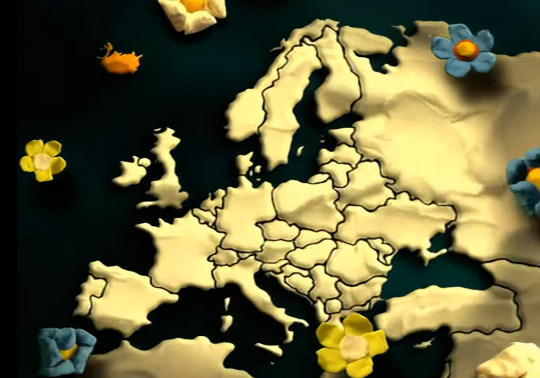
1 note
·
View note
Text
Eurovision 2003 - The Best National Final

As I've been saying for some time, there's only one winner for best national final of 2003. Söngvakeppni Sjónvarpsins 2003 take a bow. Starting off with a skit with the presenters re-enacting Paul Oskar's legendary 1997 Eurovision performance on a sofa. The line up has been expanded to 15 songs, and many of those are from the more famous names in the Icelandic music industry. That you have the proto-Pollapönk going up against Eivør Pálsdóttir, the entire thing is Icelandic music fanservice throughout.
Unfortuantely in my bracket, even though I try to arrange it so that this doesn't happen, Icelandic acts kept facing off against each other. That meant some missed out on higher slots that they achieved. One song in particular I think would have been in my top 20 is Sögur (Stories) by Ingunn Gylfadóttir - I've included it below as I can't bear just to let it go without comment.
youtube
So what about the others? Melodifestivalen had an outstanding year and settled into the format that would see it through the next two decades. Four to five heats, andra chansen and a big final. There were many strong songs in 2003 plus the beginning of the Alcazar era. This is Melfest entering its glory years.
Coincidentally, the other country adopting the Melfest format (almost exactly) is the Netherland. The Nationaal Songfestival is also tremendously strong year, with many strong songs, especially the ballads.
Poland's new Krajowe Eliminacje is straight in there and establishing itself both with big name from the Polish music scene and with a distinct mood and atmosphere that's possibly more akin to the Baltics, with some added German rowdiness in there. Sanremo holds it's own as ever, even if it didn't quite scale the heights of the previous year.
There's another format emerging thanks to the Spanish success with Operación Triunfo, as broadcasters see an opportunity to integrate Eurovision selection with their own big viewership flagship talent shows. Ireland followed that path this year with the end (for now) of Eurosong and the start of You're a Star.
Overall there's a lot of positivity about the 2003 national finals. There aren't many joke acts at all, the quality is improving, national selections are developing their own distinct flavours and although some national finals are more mono-genred than others, taken as a whole there's quite the variety.
Next year, there are semi-finals and that means even more national finals. What will all the new newbies do?
#Youtube#esc#esc 2003#eurovision#eurovision song contest#riga#riga 2003#national finals#Iceland#Söngvakeppni Sjónvarpsins 2003#Ingunn Gylfadóttir
1 note
·
View note
Text
Eurovision 2003 - Other Interesting Entries
It's that time again. The one's that, for one reason or another, stand out. That I'm beginning to find it hard to find songs for this section is a sign of the overall improvement in quality in 2003. There are far, far fewer outright joke entries.
Nevertheless, starting in Bosnia...
youtube
El Ženid & Frederique regale us with something that might be a Serge Gainsbourg tribute act.
youtube
Slightly further north, Tulio Furlanič & Alenka Pinterič in Slovenia are doing something. Not sure what, but they do have voices to try to carry it off whatever it is.
youtube
This section would not be complete without something from the German national final. This finished third.
youtube
Julian from Latvia with what amounts to a serious threat. U Can't Stop Me.
youtube
Lastly Norway join in with Soda and some in-ear/monitor problems.
#esc#esc 2003#eurovision#eurovision song contest#riga#riga 2003#national finals#Bosnia & Herzegovina#Slovenia#Germany#Latvia#Norway#Youtube
1 note
·
View note
Text
Eurovision 2003 - Number 1 - Birgitta - "Open Your Heart"
youtube
It's probably no surprise at this point that my number one for 2003 comes from Iceland - and it's their actual Eurovision entry. Birgitta Haukdal Brynjarsdóttir won Söngvakeppni Sjónvarpsins 2003 with over twice the televote numbers of second place. Given the wide variety of songs that were in the Icelandic national final, maybe it's a surprise that the winner was a conventional upbeat pop track rather than punk or bossa nova. But there is a reason that Birgitta won, beyond the song being utterly Eurovision perfect.
For three years, she'd been the lead singer with Icelandic band Írafár. They were formed in 1998 when Birgitta was 19 - a bit of a late start when compared to the careers of many Icelandic singers in the 1990s. She and the band made up for lost time by becoming one of the best known Icelandic pop acts within Iceland in the early 2000s. Their first album Allt Sem Ég Sé (All That I See) went platinum and by 2003 they were familiar faces on TV and in the Icelandic charts. To have the lead singer of that band on Söngvakeppni Sjónvarpsins was a bit of a coup, and perhaps it was expected that she would win.
That expectation was firmed up with the song. The Icelandic version, Segðu Allt mer (Tell Me Everything) easily won and, as is tradition for Iceland, got translated into English for Eurovision. The running order for Eurovision was determined by random lot in 2003, but this was one of those occasions when exactly the right song got picked. Iceland and Open Your Heart opened the show.
It's majestic pop. Nothing particularly unusual in the lyrics or construction of the song. It's got a huge key change after the bridge, it's got orchestral strings whipping up an emotional high leading into and throughout the choruses, it's got a singer in Birgitta who can not only deliver the power vocal it needs, but has a personality and stage presence filled with so much sunshine, it's almost necessary to watch her and her white trouser suit through sunglasses.
Those choruses are packed with every anthemic musical trick Birgitta and her co-writer Hallgrímur Óskarsson could think of. It's not only a sing-along, it's a heart-lifter and smile-bringer that truly set the stage for 2003 and one of the best contests in years. Of course going on first probably brought down Iceland's score, even though that meant they got to be shown last in the reversed recap. Iceland finished in a tie for 8th with Spain, but like Romania's entry, the song has lived on in Eurovision fan's memories ever since. Every time I listened to this in the bracket I was left with such a surge of joy and contentment it had to win even though it was up against many of the best Eurovision songs of the decade and a supercharged national final.
2003 was not Birgitta's first try at going for Eurovision. She'd had one previous go in 2001 - but let's just say that one is best forgotten. Subsequently she had another three attempts in 2006 (finishing 4th) as well as 2008 and 2013 (on both occasions making the final, but not reaching the superfinal).
To finish, here's a song from her band Írafár released in 2002, prior to her Eurovision appearance and from their first album. Here is Ég sjálf (Myself), showing some of the same compositional tricks used in Open Your Heart a year later.
youtube
#Youtube#esc#esc 2003#eurovision#eurovision song contest#riga#riga 2003#national finals#Söngvakeppni Sjónvarpsins 2003#Iceland#Birgitta Haukdal Brynjarsdóttir#Írafár#Hallgrímur Óskarsson
2 notes
·
View notes